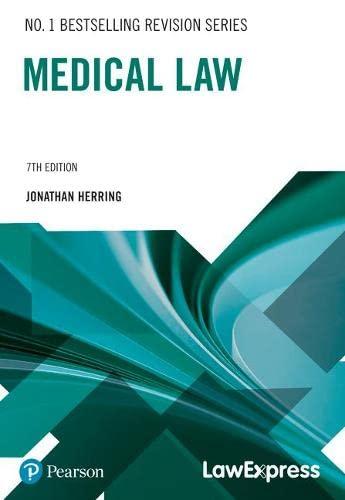Question
I was thinking of the Supreme Court decision to overturn the constitutional right to abortion. But there are so many other examples of laws being
I was thinking of the Supreme Court decision to overturn the constitutional right to abortion. But there are so many other examples of laws being made and changed that reflect shifting cultural norms or political balances of power. I recognize that the US is indeed a melting pot of opinion and ethics. And yet, we are faced with the need to have laws that apply to all of us. Cultural mores affect law making. We have seen the Supreme Court grant marriage rights to same sex couples, recreational marijuana gain legal status in many states, death with dignity laws being enacted in several states, etc. These rulings reflect the ethics of culture as they change over time.
Here is the almost impossible question: How do we enact and maintain laws that provide ethical options for a diverse populace?The obvious answer is to have a "live and let live" set of laws that allow individuals to form their own choice based on their own ethics. This poses challenges, however, as many of our choices impact the commons. Do we attempt to identify a majority cultural value regarding each topic and rule in favor of that? The challenge with this is that many will be negatively impacted, particularly people that have less means to "buy" their way out of restrictive rulings. One example being how poor women in states that are ruling against abortion do not have the means to travel to gain access to services. Do we aim for complete anarchy? It is a super tough realm of ethics to consider.
Here is the prompt:
What should we aim for, ideally and realistically, regarding the institution of cultural ethical norms in our laws? How should we do this? How should we even go about discovering what our ethical norms are? There are opinion polls that attempt to identify public opinion in the realm of ethics. Is this sufficient? And, then, with that (or better, more substantive) information, how do we craft an ethical foundation for an invariably diverse culture? Should we even try? And if we are going to aim to simply please the majority, how do we ethically support how the minority is impacted by these laws? Also, keep in mind, that notions of "minority" and "majority" do not always reflect popular numbers. They also reflect power, who has the money, who has the influence, etc. And now, we have notions of serious inequity and unethical foundations for creating legal ethical standards come into play.
In short: it's complicated!
Regardless, give this topic some deep thought and your best shot and solution finding. I do NOT want to hear your personal or religious opinion on any of this! This paper is about creating an ethical foundation for "justice for all" in an ethically diverse culture.
Step by Step Solution
There are 3 Steps involved in it
Step: 1

Get Instant Access to Expert-Tailored Solutions
See step-by-step solutions with expert insights and AI powered tools for academic success
Step: 2

Step: 3

Ace Your Homework with AI
Get the answers you need in no time with our AI-driven, step-by-step assistance
Get Started


